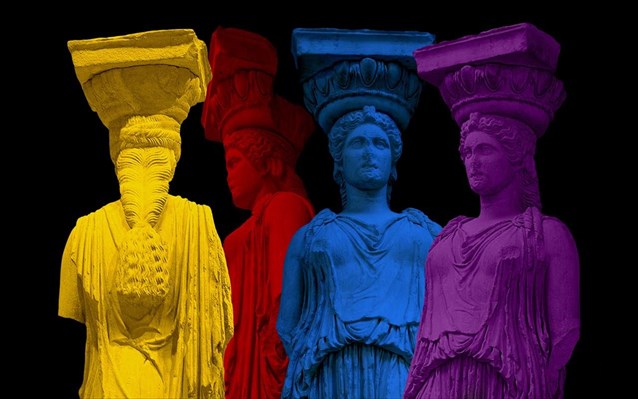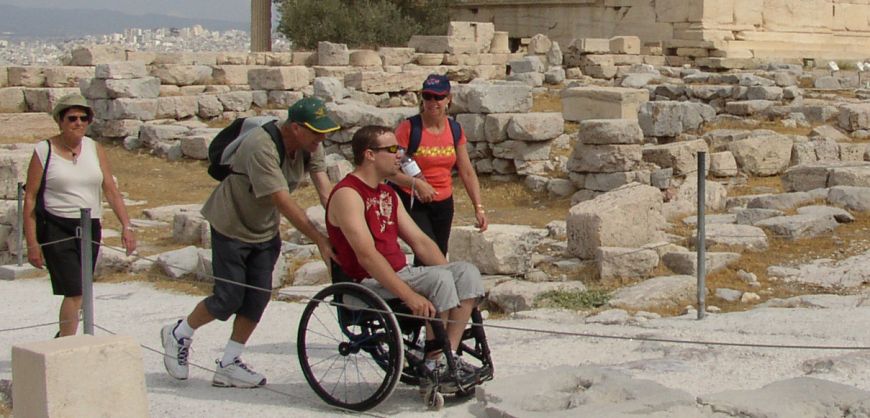We are doing a museum-related news update today, because there is a lot going on in the world of ancient Hellenic art.
Louvre Museum Exhibition on Ancient Thracian Culture

The Louvre Museum in Paris, France, is presenting a new exhibition featuring ancient Thracian artefacts, giving visitors a rare glimpse in the way of life and culture of the ancient civilization. The Thracians were a group of Indo-European tribes inhabiting a large area in Southeastern Europe, thus reports Greek Reporter.
The exhibition includes artefacts such as the Panagyurishte, a ritual beverage set made of 23-carat gold and consisting of a phial, an amphora, rhytons and drinking vessels, weighing a total of six kilos.
Louvre’s Department of Greek, Etruscan, and Roman Antiquities director, the exhibition will not be the umpteenth exhibition in France about Thracian gold: It will offer the general public an opportunity to gain broader insight into this culture.
The collection of exhibits aims to show the ancient Thracians’ way of life through the tools they used to carve their masterpieces. Furthermore, it will also include replicas of four Thracian tombs discovered in Bulgaria. According to French archaeologist Alexandre Baralis:
Missing Karyatid virtually unified with her sisters
Visual Artist & Photographer Amalia Sotiropoulou has completed her artistic trilogy with her exhibition titled 'Missing Sister-Trilogy'. The exhibition opened on the 23rd of April in the Skoufa gallery.
This is the last of a trilogy of exhibitions concerning the Erehtheion Caryatids. The first part saw the Karyatids moved to an urban setting. The sequel had Amalia travelling to the British Museum to take pictures of the stolen Karyatid. In this last part of the trilogy, the missing sister returns home to be virtually unified with her sisters and history itself.
Nat’l disabilities group wants better access to sites and museums
Members of the National Confederation of Persons with Disabilities, ESAmeA, has free access to all museums, monuments and sites around Greece, but cannot actually make use of this due to the difficulty of gaining access to these. In a letter to Deputy Culture Minister Nikos Xydakis, the group calls for the government to make the required changes to allow for people with disabilities from around the world to visit all the archaeological sites around Greece, thus reports Protothema.
The association is calling for a lift at the Acropolis as the one that is currently there, created for the 2004 Olympics and Paralympics, is not functional.
Louvre Museum Exhibition on Ancient Thracian Culture

The Louvre Museum in Paris, France, is presenting a new exhibition featuring ancient Thracian artefacts, giving visitors a rare glimpse in the way of life and culture of the ancient civilization. The Thracians were a group of Indo-European tribes inhabiting a large area in Southeastern Europe, thus reports Greek Reporter.
The exhibition includes artefacts such as the Panagyurishte, a ritual beverage set made of 23-carat gold and consisting of a phial, an amphora, rhytons and drinking vessels, weighing a total of six kilos.
Louvre’s Department of Greek, Etruscan, and Roman Antiquities director, the exhibition will not be the umpteenth exhibition in France about Thracian gold: It will offer the general public an opportunity to gain broader insight into this culture.
The collection of exhibits aims to show the ancient Thracians’ way of life through the tools they used to carve their masterpieces. Furthermore, it will also include replicas of four Thracian tombs discovered in Bulgaria. According to French archaeologist Alexandre Baralis:
"What we want to do is to present a historical and archaeological synthesis that allows us to go further, to give substance, and offers a global perspective on the history of the Odrysian kingdom from 479 to 278 BC.”
Missing Karyatid virtually unified with her sisters
Visual Artist & Photographer Amalia Sotiropoulou has completed her artistic trilogy with her exhibition titled 'Missing Sister-Trilogy'. The exhibition opened on the 23rd of April in the Skoufa gallery.
This is the last of a trilogy of exhibitions concerning the Erehtheion Caryatids. The first part saw the Karyatids moved to an urban setting. The sequel had Amalia travelling to the British Museum to take pictures of the stolen Karyatid. In this last part of the trilogy, the missing sister returns home to be virtually unified with her sisters and history itself.
Nat’l disabilities group wants better access to sites and museums
Members of the National Confederation of Persons with Disabilities, ESAmeA, has free access to all museums, monuments and sites around Greece, but cannot actually make use of this due to the difficulty of gaining access to these. In a letter to Deputy Culture Minister Nikos Xydakis, the group calls for the government to make the required changes to allow for people with disabilities from around the world to visit all the archaeological sites around Greece, thus reports Protothema.
The association is calling for a lift at the Acropolis as the one that is currently there, created for the 2004 Olympics and Paralympics, is not functional.



No comments:
Post a Comment